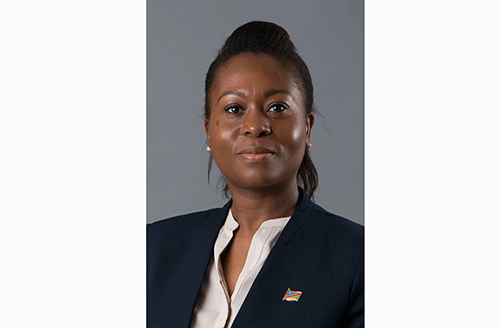Plans are well underway to transform the Ministry of Public Enterprises into a holding company to provide State-owned entities the agility to adjust to economic conditions and to derive meaningful return on investment for the Namibian people.
“The main reason for the transformation of the MPE is the potential ability of commercial public enterprises to better contribute to the economy. These entities have massive potential to increase revenue for the State,” explained acting executive director in the public enterprises ministry, Ndiitah Nghipondoka-Robiati.
“You know that during the last year, Namibia Post and Telecom Holdings (NPTH) declared more than N$900 million, almost a billion dollars, in revenue to the State. Imagine if we can have a few NPTH entities then we will not need any donor funding. The potential is there for us to be able to turn around all these public entities,” she stated.
Following a recommendation in 2020 by the High-Level Panel on the Economy, appointed by President Hage Geingob, the ministry was put under the stewardship of the finance ministry. However, a few technicalities are holding up the evolution into a holding company.
The most important aspect being considered is whether the Public Enterprises Governance Act (PEGA) needs to be amended in order for the public enterprises ministry’s function to be transferred to the minister responsible for finance.
This is according to Nghipondoka-Robiati, who during an exclusive interview this week with New Era revealed that if PEGA does not need to be amended, then the administrative work to merge or dissolve the ministry will commence.
Namibia actually has over 200 public enterprises but only 74 are major public enterprises, 40 of which are non-commercial, 22 are commercial and 12 are financial extra-budgetary.
The overall value of all Namibia’s public enterprises, including their assets, is approximately N$132 billion. This is a massive figure, considering the country’s gross domestic product is roughly N$160 billion. Out of this figure, 22 commercial public enterprises account for more than half of the total at about N$80 billion.
Any Namibian ministry can only be merged or dissolved by a sitting president, and at the end of March this year, President Geingob revealed the decision to merge the MPE with the finance ministry.
“There’s still a question of whether we are going to dissolve or if we are going to merge. If it’s a merger, then it will be the Ministry of Finance and Public Enterprises. Based on this conversation, clearly this ministry’s centrality to the economic performance of the country is evident, so it’s quite crucial that it’s not just a portfolio that we can leave hanging by the side,” said Nghipondoka-Robiati.
Noting that the merging or dissolving questions are still being pondered, the acting ED said government is currently waiting for an opinion from the office of the attorney general on the matter.
“The administrative work is pretty easy,” she said, referring to merging ministries.
“The office of the prime minister has done it before. Five years ago, the ministries of home affairs and safety and security merged, defence and veterans affairs merged, so that is not rocket science,” Nghipondoka-Robiati proclaimed.
She continued that the MPE is a smaller outfit, consisting of 36 individuals, than previously merged ministries.
“We have general services and administration, which are support units to the ministry. Then we have the technical people, the ones that analyse the Integrated Strategic Business Plans (ISBPs), the legal team that ensures PEGA is enforced. So the administrative transition would not be a problem. It is just to ensure that the law then allows for that to take place,” Nghipondoka-Robiati stated.
She added that if the PEGA does need to be amended, then the process would be set in motion to make necessary amendments; “If there are any amendments, they will be very minor. They will not be substantive. It’s not like we will have to come up with an entirely new legislation.
“However, the rest of the work still continue because the transformation of the public enterprises and their reformation, us being a professional shareholder, that is work we do on a daily basis. The only thing that has changed is that we report to the finance minister, Iipumbu Shiimi,” Nghipondoka-Robiati clarified.
The acting ED noted that another challenge for public enterprises is attracting and retaining the calibre of specialisation and skills to turn around public entities.
“Right now, the ministries struggle to attract competent skills needed for the level of complexity and business acumen to do the necessary work. We believe that with a holding company, you would then have that liberty to attract and retain the necessary skills to transform public enterprises,” said Nghipondoka-Robiati.
She further emphasised that public enterprises are for Namibians and they have to be able to do what is best for all citizens.
“Ultimately, the reason for a holding company is to ensure we create maximum value that public enterprises should be giving back to Namibia. We have very few options to redress imbalances and inequalities and I am convinced that our PEs, when they do the best they can, will be able to undertake that role,” said Nghipondoka-Robiati.
When the former public enterprises minister Leon Jooste, last year announced the establishment of a holding company, he said once all functions are consolidated under the finance ministry, government’s overall functions would be enhanced.
“They would then have to direct oversight into the financial and operational performance of public enterprises, and subsidies could then be more accurately aligned to compliance and performance,” said Jooste at the time.
“This is a decision based on technical facts and strategic rationale where the consolidation and streamlining of operational processes would inevitably result in substantial cost savings, since a separate ministry would no longer have to be maintained,” Jooste had said.
*Readers may watch the entire interview with public enterprise ministry’s acting executive director, Ndiitah Nghipondoka-Robiati, on our social media platforms.
– ebrandt@nepc.com.na



